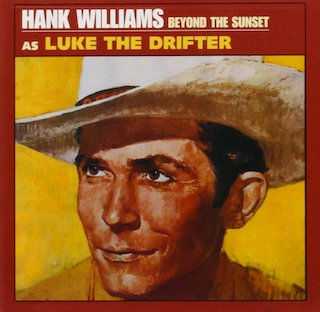
Hiram "Hank" Williams was an American singer-songwriter. He is regarded as one of the most significant and influential American singers and songwriters of the 20th century. Williams recorded 55 singles that reached the top 10 of the Billboard Country & Western Best Sellers chart, five of which were released posthumously, and 12 of which reached No.1.
"Half as Much" is an American pop standard song written by Curley Williams in 1951. It was recorded by country music singer Hank Williams in 1952 and reached number two on the Billboard Country Singles chart.
"Cold, Cold Heart" is a country music and pop song written and first recorded by Hank Williams. This blues ballad is both a classic of honky-tonk and an entry in the Great American Songbook.
"Move It On Over" is a song written and recorded by the American country music singer-songwriter Hank Williams in 1947.

"I Saw the Light" is a country gospel song written by Hank Williams. Williams was inspired to write the song while returning from a concert by a remark his mother made while they were arriving in Montgomery, Alabama. He recorded the song during his first session for MGM Records, and released in September 1948. Williams' version did not enjoy major success during its initial release, but eventually it became one of his most popular songs and the closing number for his live shows. It was soon covered by other acts, and has become a country gospel standard.
"Ramblin' Man" is a song written in 1951 by Hank Williams. It was released as the B-side to the 1953 number one hit "Take These Chains from My Heart", as well as to the 1976 re-release of "Why Don't You Love Me". It is also included on the 40 Greatest Hits, a staple of his CD re-released material.
"Honky Tonkin'" is a 1947 country music song, written and recorded by Hank Williams. His song went to #14 on the Billboard country music chart in 1948. In 1982, it became the sixth chart topping single for Williams' son, Hank Williams Jr.
"Men with Broken Hearts" is a song written and recorded by Hank Williams under the pseudonym "Luke the Drifter." It was released on MGM Records in 1951.
"My Bucket's Got a Hole in It" is a song widely attributed to Clarence Williams, who obtained a copyright in 1933, although the melody was recorded under various names years earlier. The song became popular performed by Hank Williams for MGM and reached number 4 on the country chart in 1949.
"Dear John" is a song written by Tex Ritter and Aubrey Gass. It is best remembered for being the A-side to Hank Williams' number one hit "Cold, Cold Heart" in 1951 for MGM Records.
"Weary Blues from Waitin'" is a song written by Hank Williams. It was released as a posthumous single on MGM Records in 1953.

Hank Williams as Luke the Drifter is an LP by Hank Williams released by MGM Records in 1953. It features narrations that Williams released under the pseudonym Luke the Drifter.
Pictures from Life's Other Side" is a traditional song popularized by Hank Williams under the pseudonym "Luke the Drifter." It was released on MGM Records in 1951.
"The Funeral" is a song credited to Hank Williams with words from Will Carleton. It was released as a single under the pseudonym Luke the Drifter by MGM Records in 1950.

"Just Waitin" is a song written by Hank Williams and released as the A-side of "Men with Broken Hearts" in 1951 on MGM Records. It was released under the pseudonym "Luke the Drifter."
"Beyond the Sunset" is a song written by Blanche Kerr Brock, Virgil P. Brock, and Albert Kennedy Rowswell. It was released as a single by Hank Williams under the pseudonym Luke the Drifter in 1950.
"Help Me Understand" is a song written by Hank Williams and released under the name "Luke the Drifter" on MGM Records in 1950.
"No, No, Joe" is a song by Hank Williams. It was written by Fred Rose and takes aim at Soviet leader Joseph Stalin.
"Please Make Up Your Mind" is a song written and recorded by Hank Williams and released as a "Luke the Drifter" single in 1952.
"I've Been Down That Road Before" is a talking blues song by Hank Williams. It was released by MGM Records under the name "Luke the Drifter", which was a pseudonym for Hank's recitations. It was another dose of the sage advice that Luke the Drifter seemed endlessly capable of dispensing - and Hank Williams seemed just as capable of ignoring. Biographer Colin Escott calls it "perhaps the most directly biographical song he ever wrote, and leaves us guessing at the incidents that inspired it." He recorded it in Nashville on June 1, 1951 with Fred Rose producing and backing by Jerry Rivers (fiddle), Don Helms, Sammy Pruett, Jack Shook, Ernie Newton or "Cedric Rainwater", aka Howard Watts (bass), and possibly Owen Bradley (organ).




